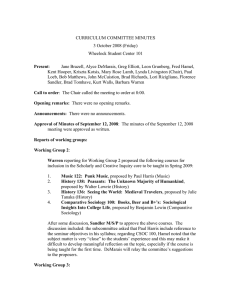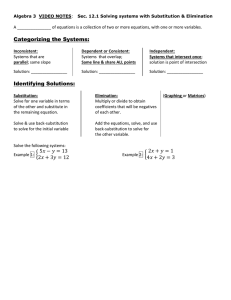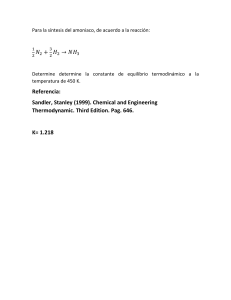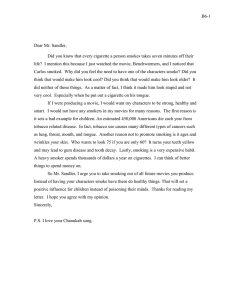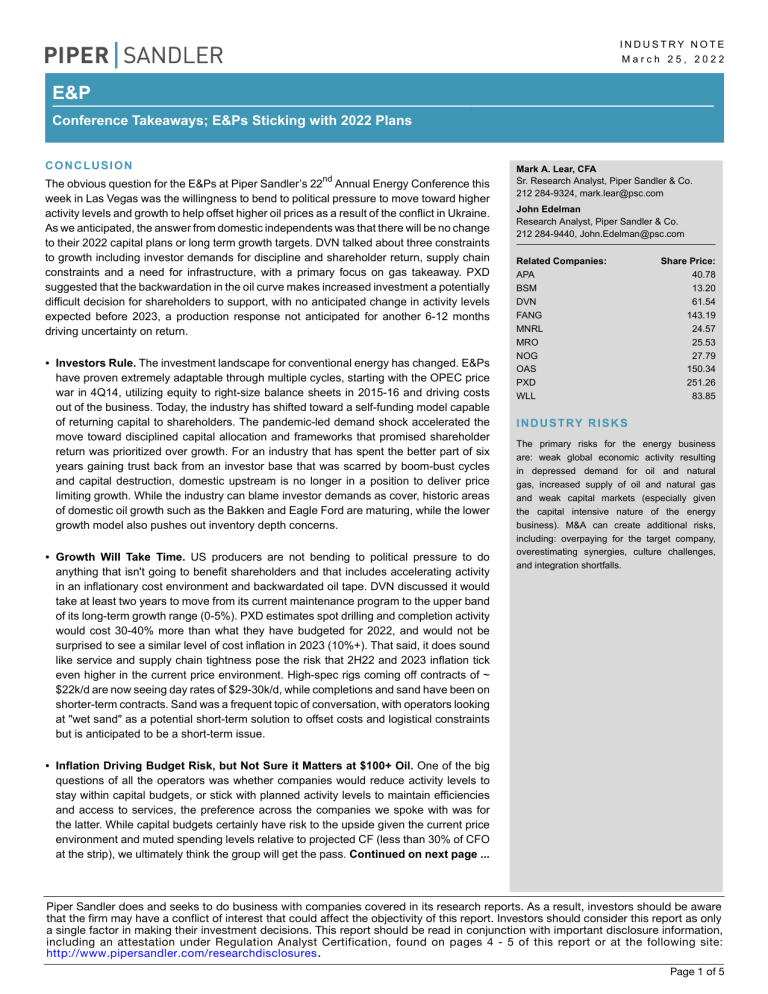
INDUSTRY NOTE March 25, 2022 E&P Conference Takeaways; E&Ps Sticking with 2022 Plans CONCLUSION nd The obvious question for the E&Ps at Piper Sandler’s 22 Annual Energy Conference this week in Las Vegas was the willingness to bend to political pressure to move toward higher activity levels and growth to help offset higher oil prices as a result of the conflict in Ukraine. As we anticipated, the answer from domestic independents was that there will be no change to their 2022 capital plans or long term growth targets. DVN talked about three constraints to growth including investor demands for discipline and shareholder return, supply chain constraints and a need for infrastructure, with a primary focus on gas takeaway. PXD suggested that the backwardation in the oil curve makes increased investment a potentially difficult decision for shareholders to support, with no anticipated change in activity levels expected before 2023, a production response not anticipated for another 6-12 months driving uncertainty on return. • Investors Rule. The investment landscape for conventional energy has changed. E&Ps have proven extremely adaptable through multiple cycles, starting with the OPEC price war in 4Q14, utilizing equity to right-size balance sheets in 2015-16 and driving costs out of the business. Today, the industry has shifted toward a self-funding model capable of returning capital to shareholders. The pandemic-led demand shock accelerated the move toward disciplined capital allocation and frameworks that promised shareholder return was prioritized over growth. For an industry that has spent the better part of six years gaining trust back from an investor base that was scarred by boom-bust cycles and capital destruction, domestic upstream is no longer in a position to deliver price limiting growth. While the industry can blame investor demands as cover, historic areas of domestic oil growth such as the Bakken and Eagle Ford are maturing, while the lower growth model also pushes out inventory depth concerns. • Growth Will Take Time. US producers are not bending to political pressure to do anything that isn't going to benefit shareholders and that includes accelerating activity in an inflationary cost environment and backwardated oil tape. DVN discussed it would take at least two years to move from its current maintenance program to the upper band of its long-term growth range (0-5%). PXD estimates spot drilling and completion activity would cost 30-40% more than what they have budgeted for 2022, and would not be surprised to see a similar level of cost inflation in 2023 (10%+). That said, it does sound like service and supply chain tightness pose the risk that 2H22 and 2023 inflation tick even higher in the current price environment. High-spec rigs coming off contracts of ~ $22k/d are now seeing day rates of $29-30k/d, while completions and sand have been on shorter-term contracts. Sand was a frequent topic of conversation, with operators looking at "wet sand" as a potential short-term solution to offset costs and logistical constraints but is anticipated to be a short-term issue. Mark A. Lear, CFA Sr. Research Analyst, Piper Sandler & Co. 212 284-9324, mark.lear@psc.com John Edelman Research Analyst, Piper Sandler & Co. 212 284-9440, John.Edelman@psc.com Related Companies: APA BSM DVN FANG MNRL MRO NOG OAS PXD WLL Share Price: 40.78 13.20 61.54 143.19 24.57 25.53 27.79 150.34 251.26 83.85 I N D U S T RY R I S K S The primary risks for the energy business are: weak global economic activity resulting in depressed demand for oil and natural gas, increased supply of oil and natural gas and weak capital markets (especially given the capital intensive nature of the energy business). M&A can create additional risks, including: overpaying for the target company, overestimating synergies, culture challenges, and integration shortfalls. • Inflation Driving Budget Risk, but Not Sure it Matters at $100+ Oil. One of the big questions of all the operators was whether companies would reduce activity levels to stay within capital budgets, or stick with planned activity levels to maintain efficiencies and access to services, the preference across the companies we spoke with was for the latter. While capital budgets certainly have risk to the upside given the current price environment and muted spending levels relative to projected CF (less than 30% of CFO at the strip), we ultimately think the group will get the pass. Continued on next page ... Piper Sandler does and seeks to do business with companies covered in its research reports. As a result, investors should be aware that the firm may have a conflict of interest that could affect the objectivity of this report. Investors should consider this report as only a single factor in making their investment decisions. This report should be read in conjunction with important disclosure information, including an attestation under Regulation Analyst Certification, found on pages 4 - 5 of this report or at the following site: http://www.pipersandler.com/researchdisclosures . Page 1 of 5 INDUSTRY NOTE March 25, 2022 Buybacks at $110/Bbl+. The pro- vs. counter-cyclical buyback debate is alive and well, and while there was more of a skew toward being opportunistic with buybacks from DVN, FANG and PXD, APA and MRO still argue the stocks represent an attractive opportunity. While we would have expected more of a preference to pump the brakes on stock repurchases with front-month crude at $110/bbl+, the equities are still discounting something closer to $70/bbl WTI LT, we think the higher oil price environment has duration given supply uncertainty, and FCF yields for the group are still in the 15-20% range. DVN was aggressive with the buyback in 4Q21, repurchasing nearly $600mm of stock and increasing the authorization to $1.6bn. The company did stress that the buyback is more of an opportunistic tool and did describe the volatility during the week of 3/14 as just that sort of opportunity, but stressed that there is more capacity to raise the base dividend with a goal of it representing 5-10% of FCF at mid-cycle pricing. PXD also stressed that it wants to be counter-cyclical and opportunistic with buybacks as it was in 4Q21 repurchasing $250mm ($181/sh) on the back of omicron concerns. FANG was aggressive with the buyback in 4Q21 as well, and where the company had discussed a limit predicated on the stock representing a PV12-15 at a $55/bbl mid-cycle price, it has revised its mid-cylce to $65/bbl. We estimate that change raises the limit or toggle between equity repurchases and variable dividend to ~$135/ sh (from $105). We Were Bullish Crude Pre-Ukraine. We sat down with our Global Energy Strategist Jan Stuart to discuss the current state of the oil market. While he was bullish ahead of the Ukraine invasion, the lack of any near- and long-term supply solutions pose a big risk to the market. We were already expecting to be through OPEC spare capacity by early 3Q22, but with upwards of 2.5mm Russian barrels not coming to market (even with the Ural spread $25/bbl below Brent) and absolutely no way to replace those barrels, we will need to see crude trade at levels that reduce demand. With the post-Covid recovery expected to drive demand approaching 103 mbbls/d in 2022 (PSC has been above EIA, IEA) and the 500 mbbls/d of compounding annual growth needed Russian growth likely inverting to a similar level of decline, Jan thinks the US will need to accelerate growth and fill the gap. Jan estimated a multi-year supply/demand gap approaching 4 mmbls/d that shale will need to fill. While we similarly see few other alternatives than shale to replace that supply gap, our E&P coverage has not indicated any willingness to depart from the re-investment and capital return frameworks that broadly have growth rates capped in the ballpark of 5%. Absent a material amount of capital formation across upstream, service and midstream, and a more supportive domestic energy policy we think that level of global sustained production is a near impossibility. Infrastructure Needs. While the brunt of the finger pointing has been in the direction of the E&Ps, the producers have stressed that they can’t do it alone. In addition to service and supply chain constraints on near-term growth, US operators have also pointed to infrastructure constraints, with Permian gas takeaway needed by late 2023/early 2024 and additional LNG export capacity to handle growing gas volumes. PXD estimates the Permian will need 2 Bcf/ d of takeaway capacity every two years to support ~5% annual oil growth, and expects one of the three projected projects moving to FID in the next 2-4 weeks. While not a near-term pinch point, DVN discussed need for additional gas processing capacity (12-18 month lead times) and also voiced support for EQT’s campaign calling for accelerated development of US gas export capacity. Bid-Ask Spreads Wide. The majority of the E&Ps we spoke with viewed the current environment as one that will be difficult for M&A given the backwardation of the curve and the commodity price expectation differences between buyers and sellers. DVN and FANG stressed that they continue to look at opportunities but have also stressed that deals have a high hurdle to compete with existing inventory. We spoke with OAS management in the wake of the recently announced MOE with WLL, and get the sense that it is not done consolidating in the basin. The combined company is expected to be net-debt free at YE22 and management expressed a comfort with adding leverage (still sub-1.0x) to do additional M&A in the basin. NOG was aggressive in consolidating its non-operated Bakken position, as well as expanding into the Delaware and Marcellus in 2021, and while it sees the current commodity price environment being more challenging for M&A it is optimistic it can continue to execute accretive acquisitions. Page 2 of 5 INDUSTRY NOTE March 25, 2022 Attractive Commodity Exposure Minus the Capital Cost Inflation. We discussed the advantages of the minerals business model with management from BSM and MNRL and the attractive commodity exposure the asset class provides. We project MNRL and BSM offering low-mid double-digit distribution yields at the strip which compares favorably with the upper band of the TSR's offered by our E&P operator coverage despite no capital expense requirements and extremely attractive EBITDA margin (~90% at MNRL). BSM and MNRL emphasized the asset class offers protection against the current inflationary forces many producers are experiencing. BSM is optimistic it can return to growth in the Shelby Trough with Aethon resuming operations and planning to accelerate activity in late 2022/early 2023 and is excited about organic opportunities across its mineral position in the higher price environment. MNRL is expected to deliver 25% growth in 2022 in the wake of the DJ acquisition in 4Q21 and a Permian deal that is expected to close in the next couple of weeks, and while the commodity volatility has made deals more difficult will continue to look for accretive oil-weighted acquisition opportunities. Page 3 of 5 INDUSTRY NOTE March 25, 2022 IMPORTANT RESEARCH DISCLOSURES Notes: The boxes on the Rating and Price Target History chart above indicate the date of the fundamental Equity Research Note, the rating and the price target. Each box represents a date on which an analyst made a change to a rating or price target, except for the first box, which may only represent the first Note written during the past three years. Legend: I: Initiating Coverage R: Resuming Coverage T: Transferring Coverage D: Discontinuing Coverage S: Suspending Coverage OW: Overweight N: Neutral UW: Underweight NA: Not Available UR: Under Review Distribution of Ratings/IB Services Piper Sandler IB Serv./Past 12 Mos. Rating Count Percent Count Percent BUY [OW] 681 67.63 291 42.73 HOLD [N] 317 31.48 62 19.56 9 0.89 0 0.00 SELL [UW] Note: Distribution of Ratings/IB Services shows the number of companies currently covered by fundamental equity research in each rating category from which Piper Sandler and its affiliates received compensation for investment banking services within the past 12 months. FINRA rules require disclosure of which ratings most closely correspond with "buy," "hold," and "sell" recommendations. Piper Sandler ratings are not the equivalent of buy, hold or sell, but instead represent recommended relative weightings. Nevertheless, Overweight corresponds most closely with buy, Neutral with hold and Underweight with sell. See Stock Rating definitions below. Analyst Certification The analyst Mark A. Lear, CFA, primarily responsible for the preparation of this research report, attests to the following: The views expressed in this report accurately reflect my personal views about the subject company and the subject security. In addition, no part of my compensation was, is, or will be directly or indirectly related to the specific recommendations or views contained in this report. Piper Sandler research analysts receive compensation that is based, in part, on overall firm revenues, which include investment banking revenues. Time of dissemination: 25 March 2022 03:29EDT. Page 4 of 5 INDUSTRY NOTE March 25, 2022 Research Disclosures Affiliate disclosures: Piper Sandler is the trade name and registered trademark under which the corporate and investment banking products and services of Piper Sandler Companies and its subsidiaries Piper Sandler & Co. and Piper Sandler Ltd. are marketed. This report has been prepared by Piper Sandler & Co. and/or its affiliate Piper Sandler Ltd. Piper Sandler & Co. is regulated by FINRA, NYSE and the United States Securities and Exchange Commission, and its headquarters are located at 800 Nicollet Mall, Minneapolis, MN 55402. Piper Sandler Ltd. is authorised and regulated by the Financial Conduct Authority, and is located at 1st Floor, New Fetter Place East, 8-10 New Fetter Lane, London EC4A 1AZ. Disclosures in this section and in the Other Important Information section referencing Piper Sandler include all affiliated entities unless otherwise specified. Rating Definitions Stock Ratings: Piper Sandler fundamental research ratings are indicators of expected total return (price appreciation plus dividend) within the next 12 months. At times analysts may specify a different investment horizon or may include additional investment time horizons for specific stocks. Stock performance is measured relative to the group of stocks covered by each analyst. Lists of the stocks covered by each are available at www.pipersandler.com/researchdisclosures. Stock ratings and/or stock coverage may be suspended from time to time in the event that there is no active analyst opinion or analyst coverage, but the opinion or coverage is expected to resume. Research reports and ratings should not be relied upon as individual investment advice. As always, an investor’s decision to buy or sell a security must depend on individual circumstances, including existing holdings, time horizons and risk tolerance. Piper Sandler sales and trading personnel may provide written or oral commentary, trade ideas, or other information about a particular stock to clients or internal trading desks reflecting different opinions than those expressed by the research analyst. In addition, Piper Sandler offers technical research products that are based on different methodologies, may contradict the opinions contained in fundamental research reports, and could impact the price of the subject security. Recommendations based on technical analysis are intended for the professional trader, while fundamental opinions are typically suited for the longer-term institutional investor. Overweight (OW): Anticipated to outperform relative to the median of the group of stocks covered by the analyst. Neutral (N): Anticipated to perform in line relative to the median of the group of stocks covered by the analyst. Underweight (UW): Anticipated to underperform relative to the median of the group of stocks covered by the analyst. Other Important Information The material regarding the subject company is based on data obtained from sources we deem to be reliable; it is not guaranteed as to accuracy and does not purport to be complete. This report is solely for informational purposes and is not intended to be used as the primary basis of investment decisions. Piper Sandler has not assessed the suitability of the subject company for any person. Because of individual client requirements, it is not, and it should not be construed as, advice designed to meet the particular investment needs of any investor. This report is not an offer or the solicitation of an offer to sell or buy any security. Unless otherwise noted, the price of a security mentioned in this report is the most recently available closing market price. Piper Sandler does not maintain a predetermined schedule for publication of research and will not necessarily update this report. Piper Sandler policy generally prohibits research analysts from sending draft research reports to subject companies; however, it should be presumed that the fundamental equity analyst(s) who authored this report has had discussions with the subject company to ensure factual accuracy prior to publication, and has had assistance from the company in conducting diligence, including visits to company sites and meetings with company management and other representatives.Notice to customers: This material is not directed to, or intended for distribution to or use by, any person or entity if Piper Sandler is prohibited or restricted by any legislation or regulation in any jurisdiction from making it available to such person or entity. Customers in any of the jurisdictions where Piper Sandler and its affiliates do business who wish to effect a transaction in the securities discussed in this report should contact their local Piper Sandler representative, or as otherwise noted below. Canada: Piper Sandler & Co. is not registered as a dealer in Canada and relies on the "international dealer exemption" set forth in National Instrument 31-103 – Registration Requirements, Exemptions and Ongoing Registrant Obligations of the Canadian Securities Administrators. This research report has not been prepared in accordance with the disclosure requirements of Dealer Member Rule 3400 – Research Restrictions and Disclosure Requirements of the Investment Industry Regulatory Organization of Canada. Europe: This material is for the use of intended recipients only and only for distribution to professional and institutional investors, i.e. persons who are authorised persons or exempted persons within the meaning of the Financial Services and Markets Act 2000 of the United Kingdom, or persons who have been categorised by Piper Sandler Ltd. as professional clients under the rules of the Financial Conduct Authority. United States: This report is distributed in the United States by Piper Sandler & Co., member SIPC, FINRA and NYSE, Inc., which accepts responsibility for its contents. The securities described in this report may not have been registered under the U.S. Securities Act of 1933 and, in such case, may not be offered or sold in the United States or to U.S. persons unless they have been so registered, or an exemption from the registration requirements is available.This report is produced for the use of Piper Sandler customers and may not be reproduced, re-distributed or passed to any other person or published in whole or in part for any purpose without the prior consent of Piper Sandler & Co. Additional information is available upon request. Copyright 2022 Piper Sandler. All rights reserved. Page 5 of 5
